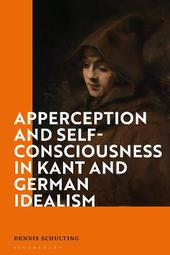
|
Apperception and Self-Consciousness in Kant and German Idealism
Paperback / softback
Main Details
| Title |
Apperception and Self-Consciousness in Kant and German Idealism
|
| Authors and Contributors |
By (author) Dr Dennis Schulting
|
| Physical Properties |
| Format:Paperback / softback | | Pages:256 | | Dimensions(mm): Height 234,Width 156 |
|
| Category/Genre | Philosophy
Philosophy - metaphysics and ontology
Philosophy - epistemology and theory of knowledge |
|---|
| ISBN/Barcode |
9781350213401
|
| Classifications | Dewey:126.0943 |
|---|
| Audience | | Tertiary Education (US: College) | |
|---|
|
Publishing Details |
| Publisher |
Bloomsbury Publishing PLC
|
| Imprint |
Bloomsbury Academic
|
| Publication Date |
21 April 2022 |
| Publication Country |
United Kingdom
|
Description
In Apperception and Self-Consciousness in Kant and German Idealism, Dennis Schulting examines the themes of reflexivity, self-consciousness, representation and apperception in the philosophy of Immanuel Kant and German Idealism more widely. Central to Schulting's argument is the claim that all human experience is inherently self-referential and that this is part of a self-reflexivity of thought, or what is called transcendental apperception, a Kantian insight that was first apparent in the work of Christian Wolff and came to inform all of German Idealism. In this rigorous text, Schulting establishes the historical roots of Kant's thought and traces it through to his immediate successors, Karl Leonhard Reinhold, Johann Gottlieb Fichte and Georg Wilhelm Friedrich Hegel. He specifically examines the cognitive role of selfconsciousness and its relation to idealism and situates it in a clear and coherent history of rationalist philosophy.
Author Biography
Dennis Schulting is an independent scholar and the former Assistant Professor of Metaphysics and the History of Philosophy at the University of Amsterdam, the Netherlands. He is the founding editor and manager of the online journal Critique and has published numerous books including The Bloomsbury Companion to Kant (Bloomsbury, 2015).
ReviewsIn this volume Dennis Schulting goes beyond his earlier close studies of Kant's Transcendental Deduction by explaining in detail how Kant's critical conception of self-consciousness plays a central and positive role in the philosophies of Reinhold, Fichte, and Hegel. A distinctive feature of the work is its extensive attention to recent secondary literature on this topic, as well as its nuanced articulation and defense of a systematic position on German Idealism that develops many related themes emphasized by scholars such as Robert Pippin. * Karl Ameriks, McMahon-Hank Professor of Philosophy Emeritus, University of Notre Dame, USA * This highly engaging study provides a subtle and intelligent interpretation of Kant's concept of transcendental apperception. It sheds welcome light on Kant's significant debt to Leibniz and Wolff and highlights Kant's profound influence on his successors, Reinhold, Fichte and Hegel. This is an eminently readable and thought-provoking study. * Stephen Houlgate, Professor of Philosophy, University of Warwick, UK *
|